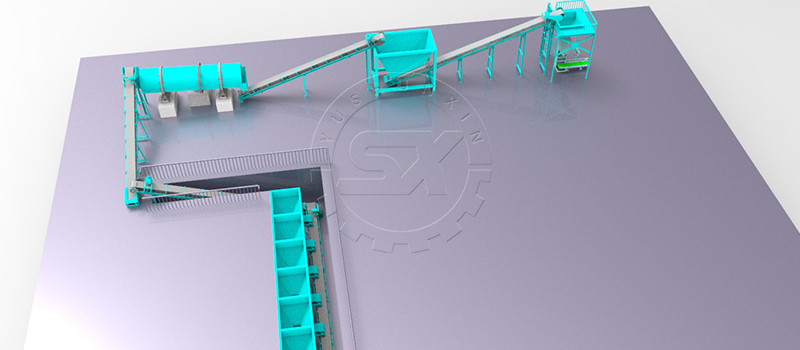NPK fertilizer refers to nitrogen, phosphorus, and potassium fertilizer. These are the key macronutrients that plants require in big amounts to grow and flourish.
Nitrogen is essential for chlorophyll production and leaf growth, phosphorus is vital for root growth and fruit and flower development, and potassium is essential for overall plant health and disease resistance.
These NPK fertilizers are often formulated as a ratio of the three elements, such as 20-20-20 or 10-10-10, indicating the percentage of every element in the fertilizer.

Powder to granules npk fertilizer making plant
How Can You Produce Your Own NPK Fertilizer?
You will find various ways how you can make NPK fertilizer. These methods include:
1.Byproduct recovery
Potassium mines, phosphoric acid plans, and ammonia plants will generate their corresponding fertilizers as a byproduct. You can choose to combine it with other materials to prepare NPK compound fertilizer.
2.Blended fertilizer
Combining different fertilizer materials is another efficient way to generate an NPK fertilizer. For instance, ammonium nitrate can be combined with potassium chloride and rock phosphate. For this, you can use granular chemical materials directly. We can provide you with bulk blending fertilizer making line, which only needs three steps to finish NPK fertilizer making.
3.Powder to granules NPK fertilizer making
NPK fertilizers can be generated by turning a certain ratio of Nitrogen, Phosphorus, and Potassium powder into pellets. That method enables precision in the NPK ratio and finished NPK fertilizer has a lower possibility of nutrients layering. It is suitable for preparing NPK fertilizer commercially. Click here to know more.
4.Organic production
Organic NPK fertilizers could be made from natural sources like green sand, blood meal, and bone meal that are rich in nitrogen and phosphorus.
Potassium could come from sources such as granite dust, kelp, and wood ashes. Organic fertilizers are more likely to release their nutrients slowly over time. That means they won’t burn the plants but also need more frequent application.
Keep in mind that the way fertilizer is generated could have an effect on its environmental effect and cost efficiency.

Fertilizer blending system for sale
Can You Benefit from Producing Your Own NPK Fertilizer?
There are different benefits to creating your own NPK fertilizer making line, such as:
- More control over your plant’s feeding – NPK ratio could be easily adjusted as per the plant’s needs and therefore be more efficient than commercial fertilizer with a fixed ratio.
- Lowered environmental impact – Producing your own fertilizer can lessen the environmental effect of your farming and gardening operation. Commercial fertilizers often have synthetic chemicals, which could be dangerous to the environment. Meanwhile, homemade fertilizers could be made from natural materials with less environmental effect.
- Reduced dependence on commercial fertilizer – Creating your own fertilizer can lessen your dependence on buying commercial fertilizer, making your farming, and gardening more self-sufficient.
- Tailored nutrient content – You can easily adjust the NPK ratio to fit the needs of your plants by making your own fertilizer.
- Cost-savings – Creating your own fertilizer could be a lot cheaper than buying commercial fertilizer.
If you need more information for NPK fertilizer making process or equipment you can visit https://fertilizerequipmentmanufacturer.com/npk-fertilizer-production-line/
